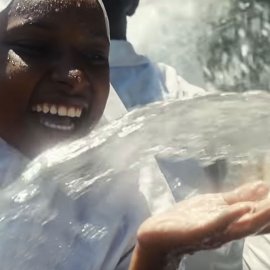Ocean Alchemy: Clean Water for Kiunga and Beyond
-
English
-
ListenPause
[intro music] Welcome to World Ocean Radio… I’m Peter Neill, Director of the World Ocean Observatory. In the middle ages, as science emerged from religion, there came a number of visionary inventors who organized a worldview that extended knowledge beyond superstition to theories of man and the universe. Using this awareness, expressed in a laboratory, alchemists became so bold as to think they could turn base metal into gold. In a sense, that endeavor represents the origin of modern process and invention that has lead us to transformative technologies such as nuclear fusion and fission, genetic modification, and artificial intelligence. How do we change one thing into another, the value measured as exponential benefit for all mankind? A recent news item suggested a contemporary example: last month, in Kiunga, Kenya, a small fishing village on the Indian Ocean, population 3,500, a non-governmental organization, Give Power, inaugurated a first solar-powered water farm in Africa, turning seawater into clean and sustainable drinking water, using a filtration system that turns brackish salt water into enough drinking water for up to 35,000 people every day, ten times the need. We speak often here on World Ocean Radio of the global water crisis. There is no part of the world that is today immune to the pollution, over-consumption, and commodification of water from land sources for irrigation, sanitation, and manufacturing, exhaustion of the most valuable natural element on earth without which none of us can survive. Again and again, we have written and argued for a water ethic, an acknowledgement that present rates of consumption and corruption of hydraulic systems cannot be prolonged, a fact now further exacerbated by climate conditions, increased drought, failed ground water re-capture and reserve, and the collapse of aquifers. The water crisis in upon us right now, evident in cities and rural areas, in the north and south, and everywhere in between where supply so evidently exceeds demand and people suffer by deprivation and death. The equation is direct and simple, the consequences are real. No one is immune. We have also spoken often here of the obvious solutions: first, mandatory conservation, re-construction of unmaintained and inefficient treatment and distribution systems, and re-organization of industrial water processes around regulatory standards for re-use and sustainability; and second, desalination of ocean water as the only alternative means to compensate additionally for the landside loss. Desalination has long been argued against –- as unnecessary, energy expensive, and environmentally polluting –- arguments informed and accepted with a false sense of security. But all those arguments go quickly away when the harsh reality of depletion is revealed, the rivers and the taps run dry, disease increases, economies fail, chaos ensues. Desalination of ocean water is the option to the scale required to meet this need. It too is fraught with peril. Historically, desal plants in the United States have been opposed by financiers, municipal leaders, and environmentalists as too costly and unnecessary; only a few have been built, but that will surely change when faced with no alternative. All the conventional economics and politics will be contradicted. There will be no other choice. To predict the future with any responsible vision, then, take a look at Kiunga, Kenya, where a small, inexpensive, transportable system fired by the sun has made an immediate difference between life and death, not just for the 3,500 locals but for the 31,500 more for whom that water will be accessible and essential to community well-being, and for all the rest of us, in Africa and worldwide with any forethought and willingness to explore the implication of this ocean alchemy, new gold as fresh water transmuted from the sea. We will discuss these issues, and more, in future editions of World Ocean Radio. [outro music]
In the middle ages, alchemists for a time believed they could turn base metal into gold. This early endeavor may be the origin story for modern invention and transformative technologies that benefit mankind. This week on World Ocean Radio we introduce listeners to GivePower, an NGO working in coastal communities around the world challenged by the fresh water crisis, to turn brackish seawater into enough drinking water for more than 35,000 people each day. Could desalination be the new modern alchemy for a sustainable future: turning undrinkable water into liquid gold?
Do you prefer the written word? Head on over to Medium.com/@TheW2O.
About World Ocean Radio
World Ocean Radio is a weekly series of five-minute audio essays available for syndicated use at no cost by college and community radio stations worldwide. Peter Neill, Director of the World Ocean Observatory and host of World Ocean Radio, provides coverage of a broad spectrum of ocean issues from science and education to advocacy and exemplary projects.
Image
Fresh drinking water from brackish seawater in Kiunga, Kenya
© GivePower
- Login to post comments



